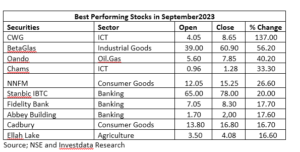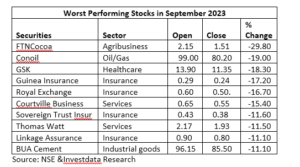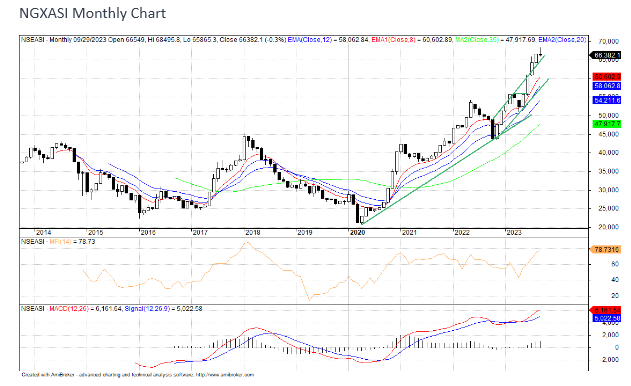Market Roundup for September
The nation’s stock market in the month of September recorded a mixed trend and performance, reflecting the buying interests and selloffs among market players, thereby halting four months of back-to-back bull transition on the back of weak macroeconomic fundamentals and profit booking. Despite the mixed sentiment witnessed over the period, the benchmark All-Share index stayed mostly above the T-line on the daily and weekly chart to close marginally lower.
As such, it strengthened the four consecutive months of volatility and pullbacks to end the quarter on a positive note, helped by the strong sentiment, improved liquidity and profit taking in blue chip stocks and high cap companies to reposition their portfolio ahead of the final quarter of 2023, knowing that profit taking or selloffs are part of market dynamics in the market. Market players were active in the month as a results of insiders’ trading activities, news of mergers, impressive first tier banks earnings reports, interim dividend announcement and payments boosted the huge volume traded for the month ahead of the Q3 earnings reporting season and year-end seasonality.
The period under review had a mixed momentum with the Nigerian Exchange (NGX) All-Share index slowing down its markup phase on a positive market breadth. In the process, the index broke out its strong resistance level of 65,385 basis points of 2008 to test the all-time high of 69,495.83bps before pulling back to close slightly above the critical resistance level of 2008. This turned to a strong support level at the end of September, while remaining on the path of recovery on monthly chart to trade above the T-line.
The possibility of reversal in uptrend is high, considering the expected revaluation and portfolio adjustment due to the prevailing economic headwinds, looking at high interest rates and rising inflationary environment as investors seek to hedge against inflation. Added to this is the expected quarterly earnings that might come mixed, reflecting the level of uncertainty in the foreign exchange market. The sectors that performed well before now are likely to consolidate and even post better-than-expected Q3 and year-end financials should be the targeted at discerning traders and investors.
Nigeria’s equity market still sustained the bullish outlook after recording year to date return of 32.85%, but pulled back at the end third quarter and month to 29.52%, on a selloff reaction to FTSE Russell downgrade of Nigerian index from Frontier to Unclassified market status due to ongoing FX market problem and instability. The bull-run in the first two months of Q3 was halted in September, showing the correlation between oil price movement and our market, with the price of crude hitting 10 months of $97 in Q3. Trading on the NGX in September, maintained its tradition as a month of positioning for the last quarter and year-end, as the pullback or price correction creates opportunity to reentered the market.
The pressure in the foreign exchange market, mixed yield outlook in fixed income market and the absence of institutional investors in the equity market are factors currently increasing profit-taking and selloffs in blue-chip stocks like GTCO, BUA Cement, Nestle Nigeria, Dangote Cement, Seplat Energy, and FBNH, among others. Also noteworthy is the fact that the ongoing correction has made dividend yield in the market to look up again.
The month’s pullback was propelled by the factors mentioned earlier, that supported the weak posture now giving an insight as to what the fact that the year 2023 would likely end in the green, in line with INVESTDATA analysts’ projection at the Invest 2023 traders and investors workshop held on December 5, 2022. This outlook was reaffirmed subsequently at different events like the Master classes, as well as the Q & A sessions with Ambrose Omordion that holds every Saturday via Zoom and has continued to record increased participation.
During the month, the composite NGXASI lost 166.85 basis points, closing at 66,382.14bps from its opening level of 66,548.99bps, representing a 0.25% drop, after touching an intra-month low of 65,865.33 and a high of 68,495.83 to remain above the 66,000bps psychological line, after breaking down various support levels. Market capitalization fell by N90.4bn, closing at N36.3tr, from an opening value of N36.2tr, also representing 0.25% value loss.
The correction recorded in September resulted from selling sentiment and mixed flow of funds searching for higher returns in the midst of portfolio reshuffling ahead of Q3 numbers. Noteworthy is the negative economic data released within the month by the Central Bank of Nigeria (CBN) and National Bureau of Statistics (NBS), which had significant impact on the market, to reflect the weak economic growth. This was because the data came in as expected, confirming fragile economy, just as inflation rate for the month of August recorded eight months high to 25.8%, from 24.08% in July, as well as the 2.51% growth in Q2 GDP. Also, Nigeria’s Purchasing Manager index (PMI) as released by Stanbic IBTC Bank fell to 50.2 points in August from 51.7 points in July.
The volatility seen during the period was high on huge volume traded that reflected active market and mixed sentiments during the period, resulting in 12 sessions of down market and eight of bull trading. Traded volume for the month rose 22.73% up to 11.23bn shares, from 9.15bn units in the preceding month.
Market breadth for the month was positive as gainers outnumbered losers in the ratio of 59:43, to short-lived four-month bull run with marginal loses after stock prices adjusted down moderately in the last few trading session of the month to resist decline. This was an apparent bargain hunting in high-priced stocks. The sell volume of total transactions for the month was 80%, while buy position stood at 20%, just as volume index for the period was 1.60.
The sectoral indexes performance was mixed for the period, as NGX Consumer Goods, Insurance and Banking closed higher with 6.5%, 5.3% and 3.1% respectively while NGX Industrial goods and Energy decline by 6.9% and 2.8% respectively for the month.
Best Performing Stocks
The best performing stock for the month of September was CWG, which appreciated by 137%, galloping on the strength of market sentiments; followed by Beta Glass’ 56.2% gain; while the share price of Oando rose 40.2% on the back of its asset acquisition news and positive 2021 financials. Chams chalked 33.3%; and NNFM 26.6%; among others.

Source; NSE and Investdata Research
Worst Performing Stocks
On the other hand, the worst performing stock for the period was FTNCocoa, which lost 29.8% of its opening value for the month, due to profit taking. Conoil lost 19% owing to the markdown for dividend and profit taking, followed by the 18.3% drop in the price of GSK; and Guinea Insurance 17.2%; on selloffs in the midst of mixed numbers and profit taking.

Ambrose Omordion
CRO|Investdata Consulting Ltd
info@investdata.com.ng
ambrose.o@investdataonline.com
ambroseconsultants@yahoo.com
Tel: 08028164085, 08179547605








